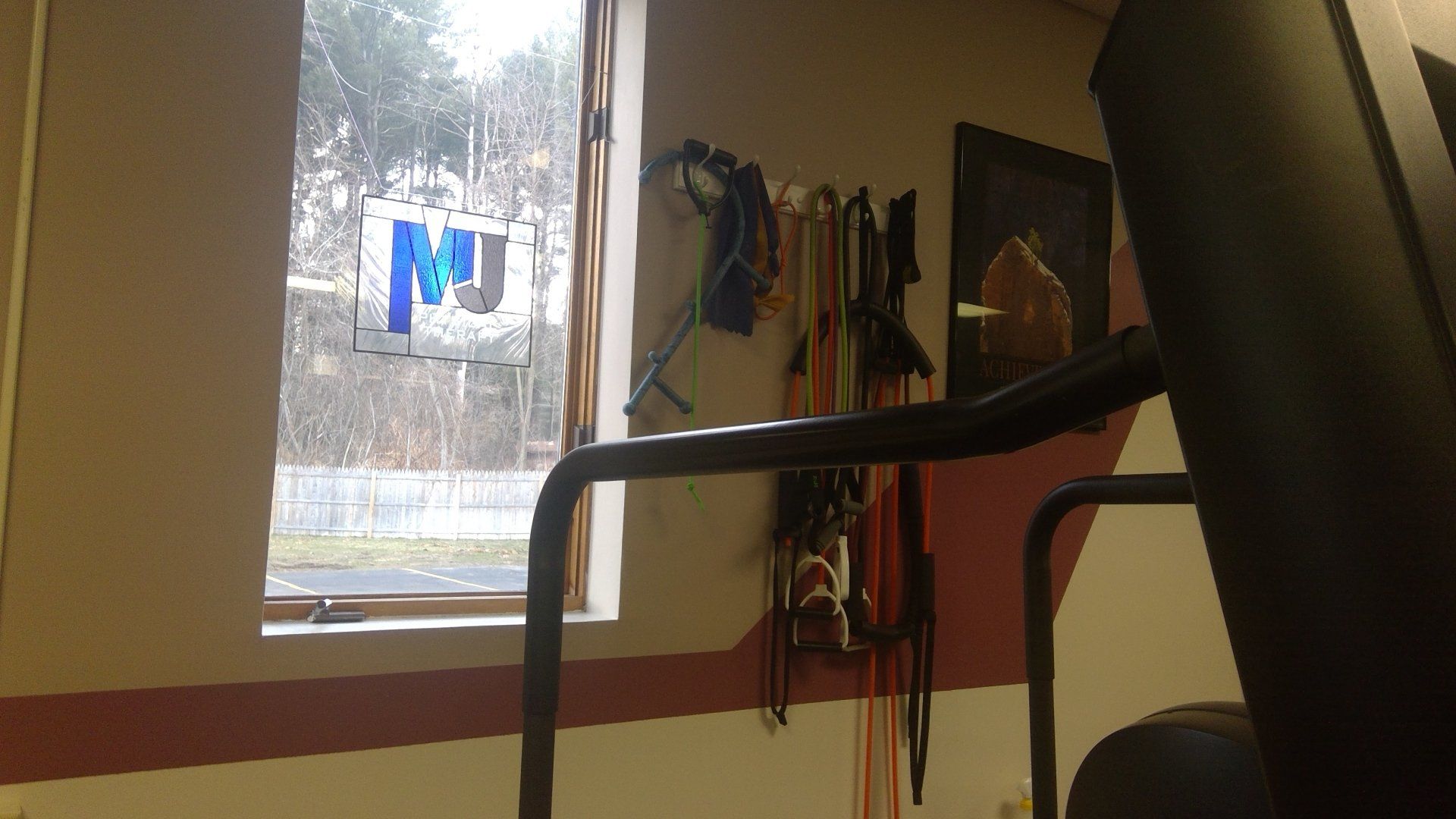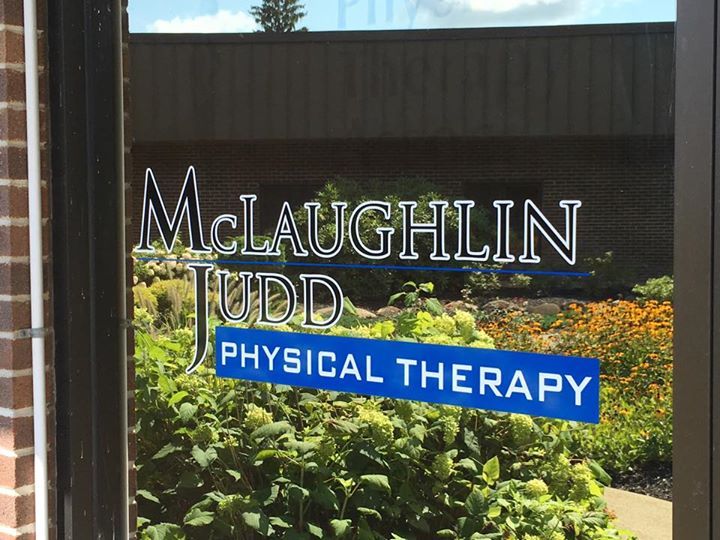I want to take a little time to share an example of how Physical Therapy can work when you have an experienced therapist that listens to your individual story.
Randy (not his real name) was complaining of debilitation left leg pain - unable to walk much or go down stairs, interfering with job duties.
Randy: "My left leg hurts when I walk more than a few hundred yards and I can't go down stairs like I usually do. This has been going on for a few months." (This is a fairly common complaint and the diagnosis the patient receives can be sciatica, knee pain, trochanteric bursitis, patellofemoral pain, etc.) This particular patient has been diagnosed with sciatica.
McLaughlin Judd Physical Therapist: Upon observing and measuring motions of the spine,\hip, and knee it is determined that the movement that produces symptoms most like the patient's complaint is full knee extension (straightening) of the left leg and both knee extension and bending are stiff and sore. All hip and spine motions are not stiff and have no effect at all on the patients pain or disability.
Treatment Strategy: By repeating the various knee motions several times, the patient and their therapist notice that by fully straightening the knee and holding it straight several times both knee bending and extending motions improve significantly and gradually become less painful. The patients is instructed in how to perform this motion at home and instructed to take 2 minutes to perform the motion four times a day and to return in a few days to check on their progress with walking and using stairs.
Next Treatment: Patient reports that they are able to walk further without pain and demonstrates much better ability to walk down stairs. The patient is instructed to continue their home exercise and add a strengthening exercise as long as it isn't painful to perform. Range of motion is rechecked and found to be full and only painful when full straightened and pressure is applied.
Last Treatment: Patient returns and reports he is pain free and has not had any knee problems with his leg at work. Range of motion is completely pain free now. His home exercise is reviewed and patient is discharged from physical therapy.
Review: The patient was able to identify a safe way to improve the motion in his leg and reduce the pain in his knee so he will be able to independently address the problem if it is to return, and has a simple exercise he can perform occasionally to maintain the health of his knee and allow him to maintain an active lifestyle. No machines or medications were necessary.
Not all knee or leg pain situations respond to physical therapy in this way but if you don't receive a thorough evaluation by an experienced therapist, these easier solutions can be missed and the result can be less effective and more expensive treatment. Advanced MDT (Mechanical Diagnosis and Treatment) training an d experience allows this type of condition to be identified and properly and efficiently treated. If you need physical therapy and want a thorough evaluation and exercises to relieve your pain give us a try.

At McLaughlin/Judd Physical Therapy we are proud of our professional experience and commitment to helping every patient that walks through our doors. We also make it known that all of our therapists have achieved MDT (Mechanical Diagnosis and Treatment) certification.
What does that mean to our patients and to the physicians that want their patients to receive the most effective treatment available?
It means that all of our therapists have achieved MDT certification which requires more than 130 hours of post graduate training and successful completion of testing to demonstrate mastery of the evaluation and treatment process
It means we will provide a careful, systematic, thoroughly researched evaluation of your condition to determine first if we can help you, and second to determine the most effective way to help you reach your goals. This process emphasizes understanding what movements or positions affect your symptoms rather than what specific body part may be causing the problem. (post surgical patients are a different category and are evaluated based on your surgeons specific protocol).
At the core of the MDT approach is helping patients apply self treatment strategies throughout their day rather than 2 times a week as most therapy or chiropractic treatment approaches advocate.
How are the treatment strategies determined? Stay tuned - the good stuff is coming.

Welcome to the McLaughlin/Judd Physical Therapy blog! We've been a little slow getting this started but first we wanted to make sure we had something to say.
When Kevin and I considered putting our name on a physical therapy clinic and making a go of it we had to answer the question why. Why would we leave a great employer and stable and successful group to go through the challenges of establishing a new name, a new administrative system, new insurance credentialing, and all the rest of it?
While we had the same reasons that anyone might have to start their own business, the most compelling was this:
By forming a small clinic with very experienced therapist, all with the same commitment to a unique yet straight forward approach to patient care, we could better control the quality of our services and the satisfaction of our patients.
The western part of the Capital Region is very fortunate to have very good health care providers; from Physicians and Nursing care to Chiropractors, Massage Therapists, and other types of alterative health providers. This wealth of skilled providers have helped to keep folks in this area active and educated in ways that enhance their health and well being.
From talking with and treating thousands of people over the years, Kevin and I have come to understand that our treatment approach and philosophy are unique to this area and different than what is offered in other healthcare settings. We realized that by concentrating on our treatment approach we could provide more effective care and our patients could expect a more consistent level of treatment than if our services were mixed in with other types of therapy.
In the next few weeks we will lay out more of the specifics of what we do (MDT, reassessment every session, education regarding effective self management, etc) and share some stories of what has been the result.

For better or worse, anyone can write a blog post about anything they want. Everyone has a voice and the best voices will rise to the top.
The writer can show their personality:
In blog posts, the writer has more leeway to add in their voice and personality than other types of writing.
Blogs are a great form of mass communication:
You can help people, learn new things, entertain your audience-the possibilities are endless and amazing. Blogging opens up all of these to a very wide audience.
You can make money:
Get the right blog going and you can make a lot of money through advertising and sponsored posts.
It allows people to craft better thoughts:
Instead of reading haphazard, uneducated Facebook statuses, it's much better to see people's thought process in a well-written blog post.
You can establish a community:
Blogging allows you to connect with other individuals who share the same interests. Sharing ideas and opinions within your community helps establish yourself as a thought leader.
Good for SEO:
Keeping content on your site fresh and relevant, you can use your blog to boost the search engine ranking (SEO) of your site and your business.
It brings people back to your site:
If your blog is strong enough and updated regularly, people will come back looking for more and bring traffic back to your site as well.
It's free:
It costs you a grand total of zero dollars to post to the blog, so if you have something to say, there's nothing to stop you.
You can establish yourself as a thought leader:
A blog is a great place for your original thoughts, and it can be a wonderful way to show off your individuality. If people like your ideas, you can become a thought leader in your industry!
What else do you love about blogs? Let me know!
I want to take a little time to share an example of how Physical Therapy can work when you have an experienced therapist that listens to your individual story.
Randy (not his real name) was complaining of debilitation left leg pain - unable to walk much or go down stairs, interfering with job duties.
Randy: "My left leg hurts when I walk more than a few hundred yards and I can't go down stairs like I usually do. This has been going on for a few months." (This is a fairly common complaint and the diagnosis the patient receives can be sciatica, knee pain, trochanteric bursitis, patellofemoral pain, etc.) This particular patient has been diagnosed with sciatica.
McLaughlin Judd Physical Therapist: Upon observing and measuring motions of the spine,\hip, and knee it is determined that the movement that produces symptoms most like the patient's complaint is full knee extension (straightening) of the left leg and both knee extension and bending are stiff and sore. All hip and spine motions are not stiff and have no effect at all on the patients pain or disability.
Treatment Strategy: By repeating the various knee motions several times, the patient and their therapist notice that by fully straightening the knee and holding it straight several times both knee bending and extending motions improve significantly and gradually become less painful. The patients is instructed in how to perform this motion at home and instructed to take 2 minutes to perform the motion four times a day and to return in a few days to check on their progress with walking and using stairs.
Next Treatment: Patient reports that they are able to walk further without pain and demonstrates much better ability to walk down stairs. The patient is instructed to continue their home exercise and add a strengthening exercise as long as it isn't painful to perform. Range of motion is rechecked and found to be full and only painful when full straightened and pressure is applied.
Last Treatment: Patient returns and reports he is pain free and has not had any knee problems with his leg at work. Range of motion is completely pain free now. His home exercise is reviewed and patient is discharged from physical therapy.
Review: The patient was able to identify a safe way to improve the motion in his leg and reduce the pain in his knee so he will be able to independently address the problem if it is to return, and has a simple exercise he can perform occasionally to maintain the health of his knee and allow him to maintain an active lifestyle. No machines or medications were necessary.
Not all knee or leg pain situations respond to physical therapy in this way but if you don't receive a thorough evaluation by an experienced therapist, these easier solutions can be missed and the result can be less effective and more expensive treatment. Advanced MDT (Mechanical Diagnosis and Treatment) training an d experience allows this type of condition to be identified and properly and efficiently treated. If you need physical therapy and want a thorough evaluation and exercises to relieve your pain give us a try.



